Age of Mythology: The Titans Kronos Showcase
Our three-part profile of the playable factions in Age of Mythology: The Titans continues with the Atlantean god Kronos, the leader of the Titans of Greek myth.
Welcome to the second of our Atlantean profiles for The Titans, the upcoming expansion pack for Ensemble Studios' mythology-inspired real-time strategy game Age of Mythology. According to Ensemble's Bruce Shelley, "Kronos is a second-generation Titan born of Gaia and Oranos. With the help of Gaia, Kronos rebelled against Oranos and freed his siblings from their imprisonment on Earth. Kronos then ruled the universe and took his sister Rheia as his wife. Fearing a prophecy that his own children would turn on him as he had turned on his father, Kronos swallowed his children as they were born. Rhea gave birth to her sixth child, Zeus, in the dead of night and fooled Kronos by giving him a stone to swallow. Zeus was then entrusted to Gaia until grown, at which point he returned and forced Kronos to regurgitate the five older children. With the help of his brothers and sisters, and other allies weary of Kronos' rule, Zeus led a war of rebellion, called the Titanomachy, through which the gods of Olympus threw down the Titans and imprisoned them in the underworld. There, Kronos plotted revenge."
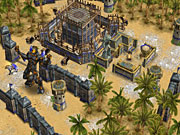
The single-player campaign of Age of Mythology: The Titans picks up where the myths left off. In Age of Mythology, the Atlanteans had risen from the sea. But they were godless, and seeing a void waiting to be filled, Kronos quickly insinuated himself among the Atlanteans, offering the Titans as gods for the sea people. Therefore, in the expansion pack's single-player campaign, you'll play as the Atlanteans as they discover the Titans, and then discover the evil agenda of Kronos as he attempts to break free from his prison and exact revenge upon the gods of the world.
The three major gods in Age of Mythology: The Titans will all have tangible and powerful unique abilities. The designers really wanted to exaggerate the differences between the gods this time, and although they couldn't go back and make the existing gods more "unique," so to speak, they could at least guarantee that the Atlantean gods would be very distinctive. This is why Gaia has abilities derived from her status as an Earth goddess. Kronos' unique ability stems from his role as a god of time.
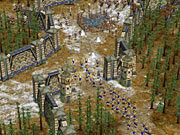
The unique ability, time shift, can be an extremely powerful tactic if used correctly, as Shelley explained: "Select any of your buildings (other than town centers or wonders), and click on the time shift icon. This creates a mirror image of the building that you can move on the map with your cursor. The building can then be placed anywhere else on the map within your line of sight. The building deconstructs from its original location and rebuilds at the new one. This time shift takes time and can be disrupted or even destroyed by enemy attacks, but the ability to move a palace, barrack, or tower quickly to a strategic location can be a powerful weapon. As soon as the building has completed shifting, it can begin producing and fighting, if it has fighting capability. Time shifts do consume resources, and the amount depends on whether the building can attack or not. Buildings such as the palace, which have a good attack, cost more to deconstruct."
More Powers of Kronos
Using the time shift ability, Kronos players can move nearly any building around the map. It isn't free, and you can shift only one building at a time, but it does give you unparalleled freedom in shaping your cities and war efforts. It's a rather typical real-time strategy game tactic to build a small expansion base near a new set of resources and then build a barrack and possibly a few towers nearby for defense. But when these resources are depleted, this expansion is abandoned, and the buildings themselves go to waste. Also, these expansion bases are sometimes so far away from the main base that trying to coordinate an attack or defense using the expansion's structures and units is futile, because it simply takes too long for the units to cover the distance. However, Kronos players can move their expansion buildings back to their home base, or to new resource areas--or they can use this ability to collect their isolated military buildings and create a forward base of operations near an enemy camp. And Kronos players can build their buildings anywhere without having to worry about optimal placement, since they can always establish a more-efficient layout later on.

Kronos' god power, deconstruction, follows a similar theme, but it is more of an offensive weapon against enemy players. In fact, in this case, you regress a building backward in time until it is nothing. Shelley explained that you can "target any enemy building you can see on the map and Kronos will deconstruct it. The owning player gets the resources back but loses the service of the building. This is a great way to take down an enemy palace or tower that stands in the way of an attack or guards an important point on the map. Deconstruction does not affect town centers or wonders, and although you can use it multiple times, it has a tremendously long cooldown time between uses. You probably won't be able to use it multiple times in one battle."
Meanwhile, Kronos has a myth technology that aids in reconnaissance. Oracles are the Atlantean scout units--they reveal the map by moving to a new area and standing still while their range of sight expands--and Kronos' oracles are better than the rest. "Kronos' mythological improvement is focus, which increases the movement speed of oracles and the rate at which their line of sight expands," Shelley said. "Focus thus improves the scouting ability of your oracles, and [saves you the time of waiting for their sight radius to expand]." Other oracles have to wait much longer to establish a line-of-sight radius, while Kronos oracles can get to a spot faster, survey the area faster, and then move on to the next spot while the other oracles are still waiting for their field of view to increase.
Finally, as a warlike god of time, Kronos has no economic bonuses. Instead, his other bonuses are to siege weapons and myth units. Ensemble designer Ian Fischer said that the actual numbers haven't been finalized yet, but Kronos siege and myth units will be 10 to 15 percent cheaper to build. They are not otherwise better than the other cultures' siege and myth units.
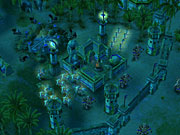
Kronos' other abilities come about through his choice of minor gods as you advance through the ages. According to Shelley, "when you reach the Classical Age, the minor gods available under Kronos are Leto (discussed in the Gaia showcase) and Prometheus, the god of forethought. Prometheus was given the task of creating humankind, but his compassion for his people was so great that he defied the gods by giving humans fire and deceiving Zeus. When Zeus learned of this treachery, Prometheus was chained to Mount Caucasus, exposed to attack by a giant eagle that fed daily on his ever-regenerating liver. Many generations later Herakles freed Prometheus of this torture."
Prometheus' most immediate benefit is his myth unit, the promethean. He also has a god power called valor that is very useful in battle, as well as three useful mythological technologies.
Kronos' Minor Gods
Prometheus was a great thinker and inventor, and his genius has given rise to clay men that are at your beck and call. These creatures of clay are stoic melee fighters. Because they are second-age units, they aren't too powerful individually, but they are cheap and have a great ability. Instead of being killed when reduced to zero hit points, they split into two smaller prometheans. These baby prometheans can be killed normally, but this ability greatly extends the longevity of this unit in battle. You can also research myth technologies to improve their strength.
Valor, Prometheus' god power, is very useful if you expect to be attacked by myth units quickly. It can also be used multiple times in a battle. According to Fischer, "Valor is an area-of-effect god power that transforms some of the player's units into heroes. Atlantean players can change their units into heroes for a cost; this god power allows them to do it for free." The transformation also happens instantly. For Atlanteans, this can provide a tremendous military advantage. This powerful ability can convert villagers into villager heroes that work much faster. It can also change a group of infantry into infantry heroes, giving them a great bonus against attacking myth units. This power won't convert all the units you see on screen, so if you target a group of 10 units, only four or so will become heroes. But, as Shelley said, "This power is useful when you encounter a force of enemy myth units and need heroes quickly."
Prometheus' mythological improvements include alluvial clay, which increases the health of the big and small prometheans; heart of the titans, which reduces the cost of converting your units into heroes; and heroic fleet, which makes your ships better against myth units in battle. When you advance to the third age, you have new choices. "Going to the Heroic Age, Prometheus allows you to choose between Rheia (discussed in the Gaia showcase) and Hyperion, the Titan god of watching and observation," Shelley said. "In The Titans, he especially helps with your hero units."
Hyperion gives you two myth units when you choose him for the Heroic Age. One is a land unit, the satyr, and the other is a sea unit, the nereid. The satyr is half-man, half-goat, and it is a ranged unit that hurls a javelin. Its special attack is to hurl multiple projectiles in one throw. The nereid is a woman riding a shark, and she is very strong against other myth units, almost like an anti-myth water unit. Her special attack is a bite from her shark mount.
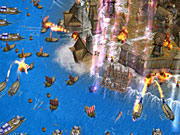
We actually had a chance to try out Hyperion's god power, chaos. You can use chaos on a group of enemy units to make them go berserk and to regard all units as enemies, including their own. You don't control them at all, but they will attack the first thing they see--usually the units that were marching next to them. Cast it on units in the back of an enemy army and your foe will suddenly lose some of his or her troops and be attacked from behind. If they survive, the units will then wander around attacking any other nearby units.
Hyperion's two mythological improvements are gemino, which doubles the number of javelins the satyr throws, and heroic renewal, which lets your heroes regenerate. "Generally speaking, heroic renewal is fast enough that it isn't painful to pull back and heal, but slow enough that heroes aren't unkillable in combat," Fischer said.
Final Powers
But the most awesome of gods and powers are obviously reserved for the final age. "Entering the Mythic Age, you may choose between Atlas (discussed in the Gaia showcase) and Helios, a Titan of Zeus' generation and the god of the sun," Shelley said. "Helios rose from the ocean at dawn each day and rode his chariot across the sky, carrying the sun and descending at night into the west. He saw all and knew all, and was often called upon by other gods to be a witness."
Helios provides you with an abundance of myth benefits. He offers two myth units, but he also gives you a myth building. Myth buildings are buildings that cost favor, wood, and gold. In this case, Helios lets you build the mirror tower, which focuses sunlight into death rays. Besides their laser-like attack, they're just another type of tower.
Helios' two myth units are the sea-going man o war and the hekagigantes. The man o war is a giant jellyfish that attacks with chain lightning. Its electrical bolt will damage land and sea units. It is good against enemy ships, but not as good against sea myth units. The hekagigantes is a massive, multiple-armed giant--a melee unit that attacks with its fist, but also has a special ability called ground pound that lets him throw nearby enemies off their feet and injure them by smashing the ground beneath him, causing an earthquake. "The hekagigantes is an expensive fourth-age unit, so he is pretty strong," Fischer said. "His ground pound is very powerful when used to clear large groups of opponents."
Helios' god power is vortex, and it is very useful both offensively and defensively. "In The Titans, Helios' god power is the vortex," Shelley said. "Call down this power to pluck all of your military and myth units from the map, regardless of placement, and drop them anywhere within your line of sight. This is very useful for bringing your army quickly to an unexpected point, for either an attack or on defense. Note also that vortex is the only mythic-age god power with multiple uses." So with this power, you just click on an area, and a swirling vortex appears there. Seconds later, all your military units pop in at that location. You must have line of sight to the vortex site, but it has amazing uses in battle.
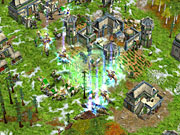
Helios' mythological improvements are halo of the sun, which increases the attack of fire siphons and fire ships, and petrified, which gives your siege units improved armor against melee attacks from enemy units. They'll sustain anywhere from 15 to 20 percent less damage from hack attacks with this advancement.
Whatever you may think of Kronos and his evil intentions, he's a very powerful god with an impressive array of abilities. But his time is up. In our third and final installment of our profiles of The Titans, we'll turn to the third and final Atlantean god, the Titan Oranos, the god of the sky.
Got a news tip or want to contact us directly? Email news@gamespot.com
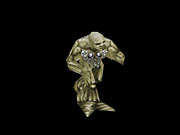
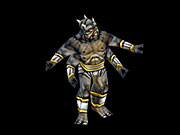
Join the conversation